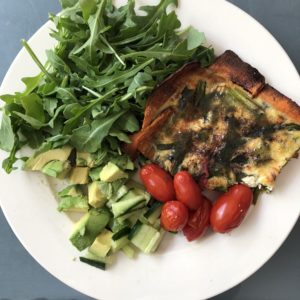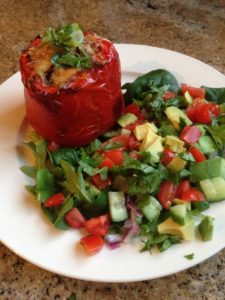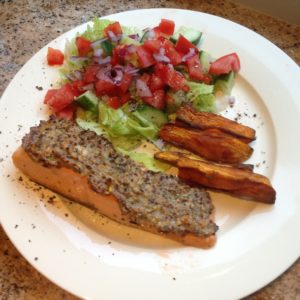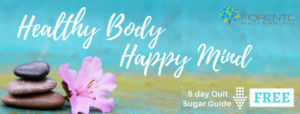A case for Grass Fed Beef
Animal protein is our only food source of vitamin B12, creatine and carnosine and although you can obtain iron and zinc from plants they are more bioavailable in meat.
However, there have been concerns raised of the risk of numerous cancers from eating meat. Australia’s dietary guidelines recommend limiting lean red meat consumption to a maximum of 455g per week to reduce the risk of cancers. I have wondered if maybe these studies have shown such risks because they used grain fed cattle and if results would be different if grass fed beef were used. Cows, like people, are what they eat.
Up until relatively recent times, cows ate only grass. The grass leaves and shoots contain vitamins, minerals and other nutrients. They also contain tough fibre which unlike humans, cows are able to cope with due to their specialised digestive systems.
However throughout the years of the agriculture boom, because grains were cheaper and higher in calories they were used to fatten up the cows faster to produce more profit quicker. Unfortunately these grains (usually corn, soy, canola) change the nutrient and fat profile of the meat. An Australian study comparing meat from grass-fed cattle with grain-fed for 80 days found that grain feeding reduced omega-3 content, while increasing levels of trans and saturated fats.
Health benefits of Grass Fed compared to Grain fed
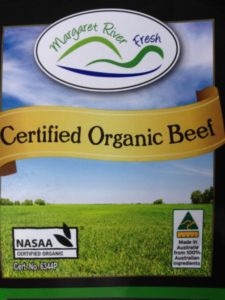
Compared to grain fed, grass-fed meat contains more cancer-fighting antioxidants such as:
- anti-inflammatory omega-3s
- precursors for vitamin A
- vitamin E
- calcium
- magnesium
- potassium
- CLA (conjugated linoleic acid) which is a type of fat that’s thought to boost metabolism and reduce heart disease and cancer risks.
Grass-fed meat has fewer inflammatory omega-6s than grain fed and tends to be lower in overall fat content.
In addition grass fed is more humane to the animals. Grass fed cattle enjoy a more sanitary and peaceful environment than the intensely overcrowded feeding lots of grain-fed cows. Grain also increases the acidity of the cattles’ stomachs, giving them a type of ongoing heart-burn.
Use of Antibiotics
The corn-fed cows tend to have high levels of E-Coli bacteria that are harmful to humans, which is usually treated with antibiotics (the same ones used to treat human diseases). Australia imports about 7 hundred tonnes of antibiotics annually – only 30% is used for human treatment, about 8% is for veterinary use, leaving over 50% used in stock-feed. Overuse and misuse of antibiotics (including the widespread use in cattle production) has led to a serious threat to humans because of the drug-resistant bacteria/super bugs it produces. Antibiotic-Resistant Infections Doubled Since 2007 in Europe with the estimated burden of these infections being similar to the combined burden of influenza, tuberculosis, and HIV.
Consuming meat from poorly raised animals, fed with poor quality food and 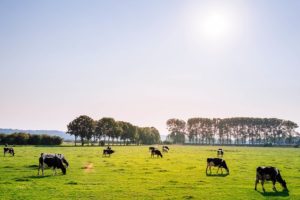 treated with antibiotics is not a healthy choice for humans and is a more inhumane choice for the cattle. By more people choosing grass fed beef the supply and demand rule should result in the a better price, a reduction of antibiotic use in cattle and a happier life for such beautiful creatures. I realise I have not addressed the cruelty of abattoirs, I hope one day we can change this sad process and return to a more humane way of putting meat on our table, if you are able to source a local farmer able to do this process it would be a great step in the right direction.
treated with antibiotics is not a healthy choice for humans and is a more inhumane choice for the cattle. By more people choosing grass fed beef the supply and demand rule should result in the a better price, a reduction of antibiotic use in cattle and a happier life for such beautiful creatures. I realise I have not addressed the cruelty of abattoirs, I hope one day we can change this sad process and return to a more humane way of putting meat on our table, if you are able to source a local farmer able to do this process it would be a great step in the right direction.
I’d like to give respect for vegetarians, for choosing not to harm animals, I can totally understand this way of thinking. However on a health side of things, especially in the case of vegans, it can be very difficult to get all the vital nutrients needed for health from plants only. Vegans are often deficient in nutrients especially B12, iron, zinc, creatine, vitamin D, Carnosine and more.
As with most things in life, moderation is the key here and you need to go with what suits “your” body and beliefs. If you choose to eat meat then choosing a lean cut of grass fed beef several meals per week will help with iron, protein and other nutrient levels. If you choose not to eat meat there is plenty of other nourishing and beneficial foods to choose from but you will need to make the extra effort to research how to get all nutrients your body needs, contact me if you would like some guidance.
If you find the thought cutting meat intake hard to imagine how about starting with Meat free Monday.
Here are a few of my favourite meat free dishes:
Sweet potato base asparagus quiche
Mexican stuffed capsicum
Roasted salmon
Fish is a great source of omega 3 fatty acid, especially with mustard and dill
And I also agree with Dr Weaver statement “with today’s modern farming and increase of toxins in the environment I believe that supporting a well balance diet with supplements is wise and necessary”. Please contact me if you would like some advice about which vitamins are best for you.
Would like to receive fortnightly recipes & tips like these straight to your inbox? Subscribe >>HERE<<
Want some Support?
FREE 5 Day Quit Sugar Support Program to help you get started on a healthier you
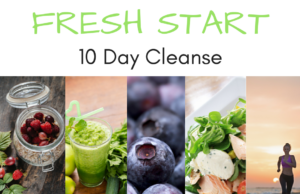 My 10 Day Cleanse is a great way to nourish your body, rejuvenate your gut, liver, reset your blood sugar & hormones, kick start your weight loss. With yummy, healthy, gut nourishing foods and a supplement package which includes, probiotics to replenish your good bacteria, fibre (absorbs toxins, feeds your good gut bacteria) along with high quality anti oxidants, multi minerals, herbs & phytonutrients to enhance the detox process & support your body.
My 10 Day Cleanse is a great way to nourish your body, rejuvenate your gut, liver, reset your blood sugar & hormones, kick start your weight loss. With yummy, healthy, gut nourishing foods and a supplement package which includes, probiotics to replenish your good bacteria, fibre (absorbs toxins, feeds your good gut bacteria) along with high quality anti oxidants, multi minerals, herbs & phytonutrients to enhance the detox process & support your body.
For more FREE Overall Holistic Health info![]() my Fiorente Health Facebook Page, lots of quick health tips and recipes and motivational quotes
my Fiorente Health Facebook Page, lots of quick health tips and recipes and motivational quotes
If you would like to catch up in person you can make an appointment for a FREE initial consult
I’m looking forward to getting to know each other better
References
- citeseerx.ist.psu.edu/viewdoc/download?doi=10.1.1.563.621&rep=rep1&type=pdf
- Dr Libby Weaver. “What am I supposed to eat?”
- https://books.google.com.au/books?id=uiXgDQAAQBAJ&pg=PT237&lpg=PT237&dq=USDA-conducted+study+comparing%C2%A0corn-fed+beef%C2%A0and+grass-fed+beef+showing+that+grass-fed+beef+is+“higher+in+beta-carotene,+vitamin+E,+omega-3s,+conjugated+linoleic+acid+(CLA),+calcium,+magnesium,+and+potassium;+lower+in+inflammatory+omega-6s;+and+lower+in+saturated+fats+that+have+been+linked+to+heart+disease&source=bl&ots=SmttkkVMdz&sig=_fAWfXpjMv-JeuWbkkKpu44G-to&hl=en&sa=X&ved=2ahUKEwjD_dGEmtDeAhVaWX0KHUvgDJ4Q6AEwC3oECAUQAQ#v=onepage&q=USDA-conducted%20study%20comparing%C2%A0corn-fed%20beef%C2%A0and%20grass-fed%20beef%20showing%20that%20grass-fed%20beef%20is%20“higher%20in%20beta-carotene%2C%20vitamin%20E%2C%20omega-3s%2C%20conjugated%20linoleic%20acid%20(CLA)%2C%20calcium%2C%20magnesium%2C%20and%20potassium%3B%20lower%20in%20inflammatory%20omega-6s%3B%20and%20lower%20in%20saturated%20fats%20that%20have%20been%20linked%20to%20heart%20disease&f=false
- https://www.ncbi.nlm.nih.gov/pmc/articles/PMC2846864/
- https://www.ncbi.nlm.nih.gov/pubmed/20219103
- https://ucanr.edu/blogs/blogcore/postdetail.cfm?postnum=2582
- https://www.ncbi.nlm.nih.gov/pubmed/15941017
- https://www.mayoclinic.org/diseases-conditions/heart-disease/expert-answers/grass-fed-beef/faq-20058059
- http://www.abc.net.au/science/slab/antibiotics/agriculture.htm
- http://citeseerx.ist.psu.edu/viewdoc/download?doi=10.1.1.563.621&rep=rep1&type=pdf
- https://www.ncbi.nlm.nih.gov/pubmed/7797810
- http://toplinefoods.com/grass-fed-beef-info
- https://www.rd.com/health/healthy-eating/vitamin-deficiency-vegetarian-vegan/
- https://www.medscape.com/viewarticle/904640?nlid=126033_1842&src=WNL_mdplsfeat_181113_mscpedit_wir&uac=162775PZ&spon=17&impID=1799761&faf=1#vp_1

